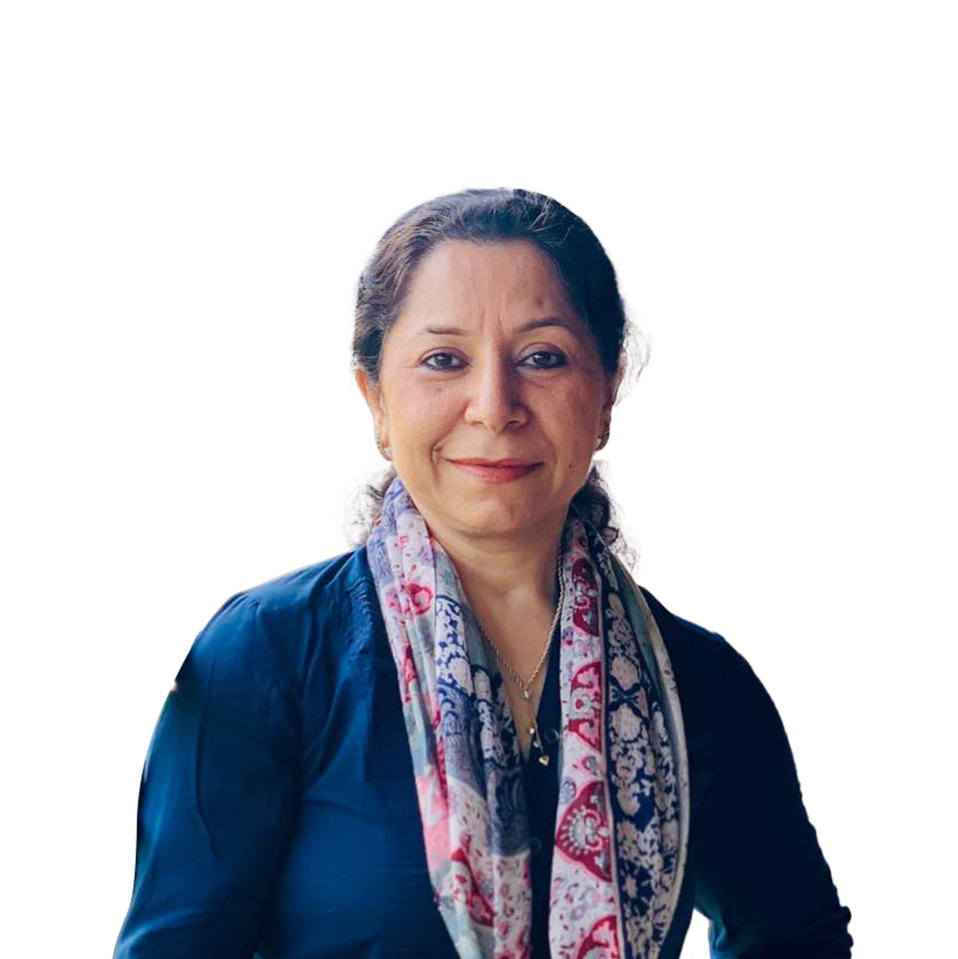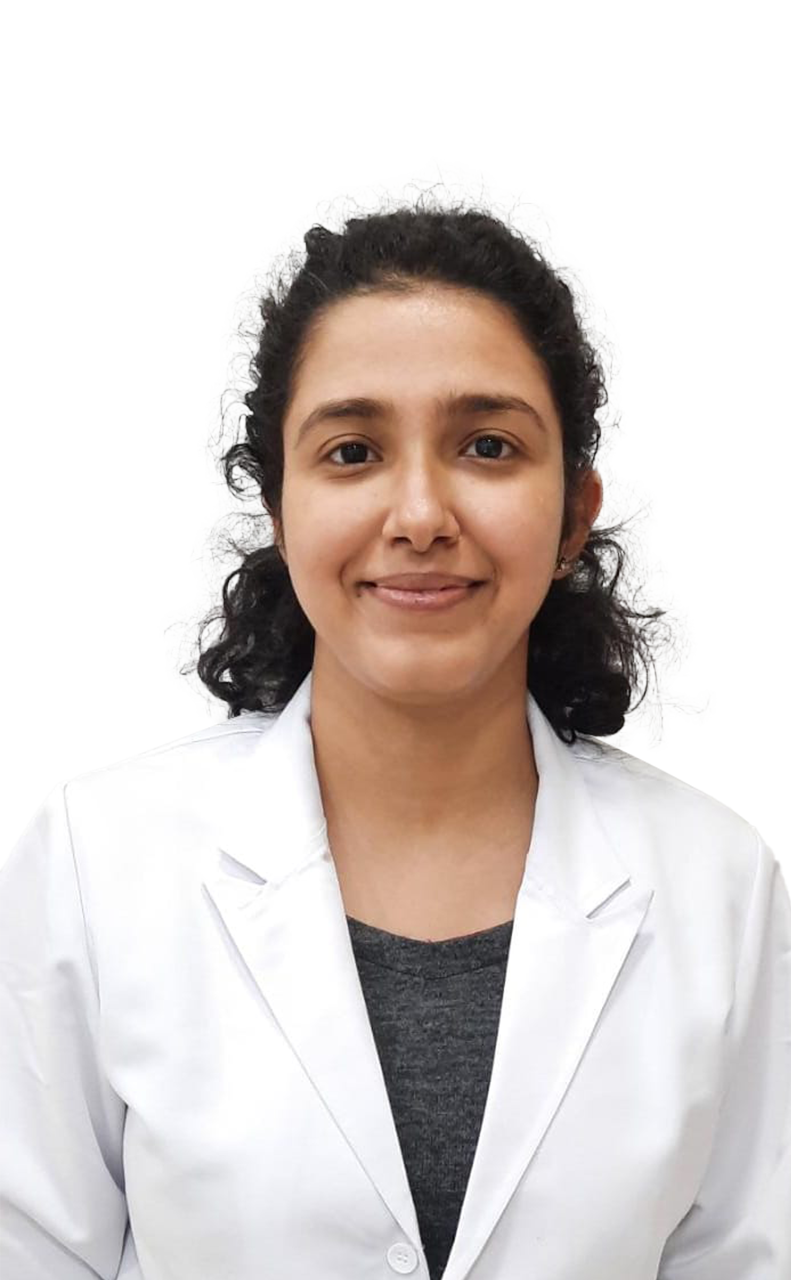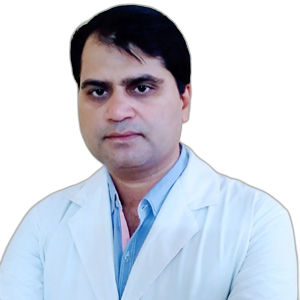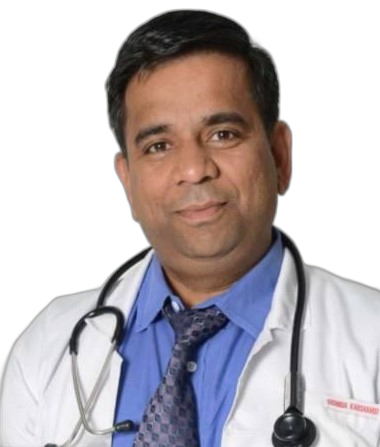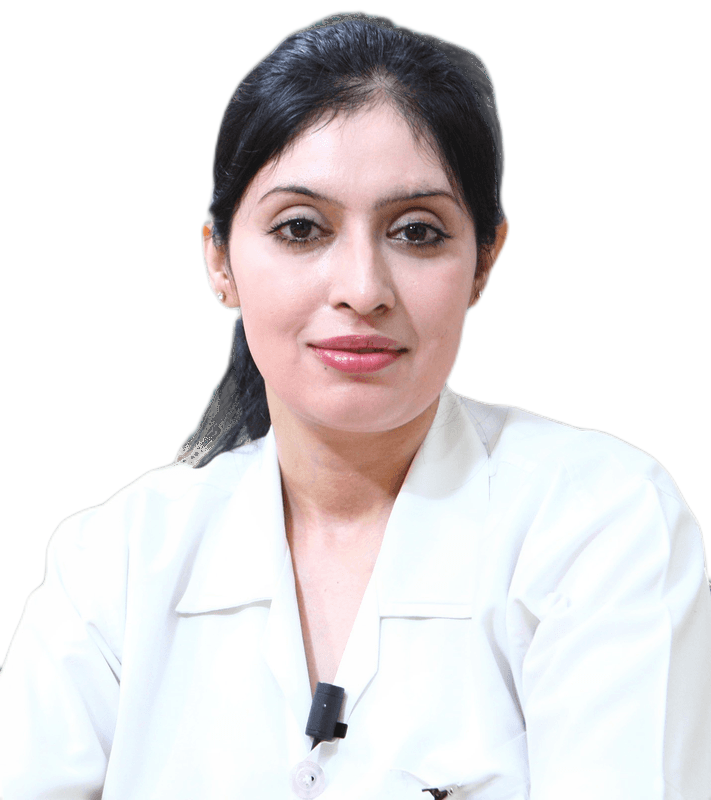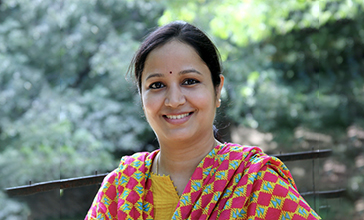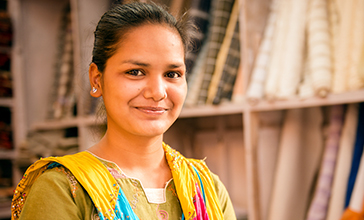WHAT WE TREAT
DISCOVER
SHOP ALL
PCOD/PCOS
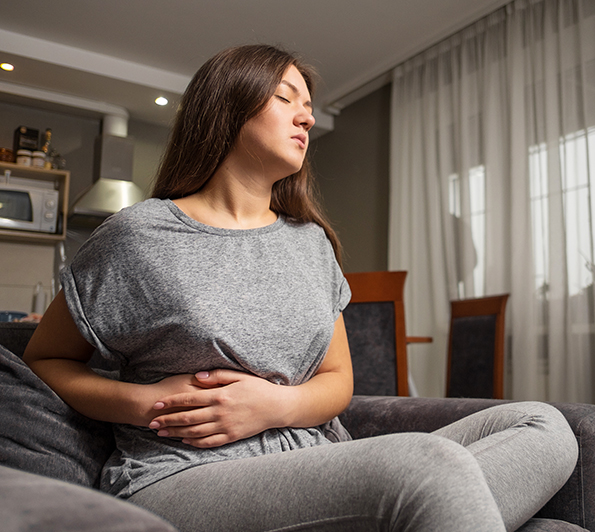
Understanding PCOD/PCOS
A medical condition where a woman’s ovaries produce partially mature or completely immature eggs in vast numbers during the reproductive age is known as PCOD. On the other hand, PCOS is a metabolic disorder wherein women are influenced by hormonal imbalances.
Symptoms of PCOS/PCOD
Irregular menstrual cycles, unwanted hair growth, hormonal imbalances, unexpected weight gain, hair loss, emotional factors like anxiety, irritability, fertility issues and skin discolouration in the neck, groin and underarms can be the common symptoms of PCOD/PCOS.
Causes of PCOD/PCOS
Insulin resistance, imbalances in testosterone hormones, genetic disorders, low-grade inflammation, emotional factors like stress, sedentary habits, unhealthy eating choices, and endocrine-disrupting chemicals in pesticides and plastics.
How Common is it?
1/5
women in India are affected by PCOD/PCOS
62%
of women with the condition suffer from insulin resistance
59%
of women diagnosed with PCOD/PCOS are fighting obesity
73%
of women with PCOD/PCOS experience irregular menstrual cycles
Want to find out more? We worked with our doctors to create this Ultimate Guide to ED
Your personalized Treatment
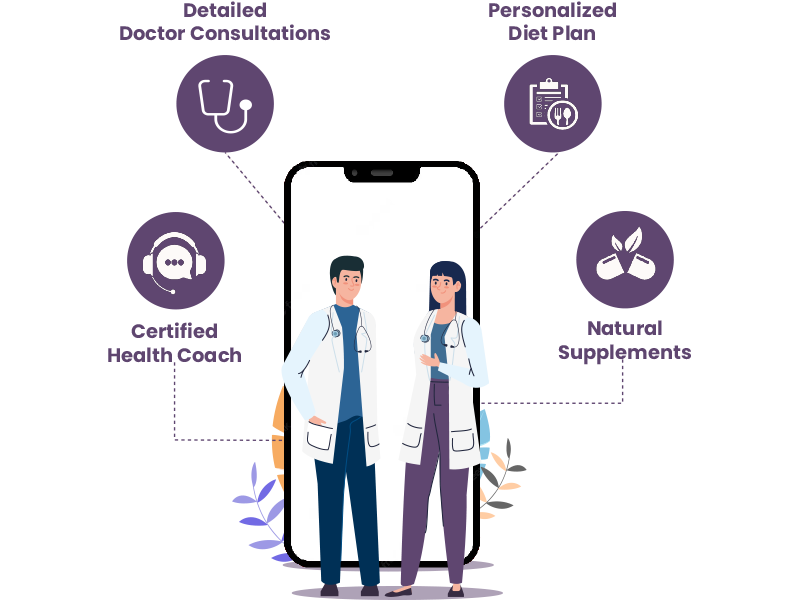
Our Medical Board
Case Studies
FAQ

Is PCOS caused by stress?
Stress cannot be the sole reason behind the cause of PCOS but definitely it is one of the symptoms. Excessive stress results in the release of cortisol (stress hormone) in abundance which can elevate reproductive dysfunction and help in the development of PCOS.
Is it safe to take PCOS medication when I am in periods or spotting?
Generally, it is safe to consume PCOS medication during menstruation or when spotting. Although, it is always better to consult a professional doctor or a Pro-nutritionist for proper guidance on your condition. By evaluating your condition, they will suggest you proper steps to follow and you can continue with your medication without any issue.
Can PCOD/PCOS affect fertility?
Yes. PCOD/PCOS has a great impact on fertility. The two main symptoms of PCOS are hormonal imbalances and irregular ovulation which can obstruct in attempting to become pregnant. However, with proper medication and expert guidance, many women have been able to minimize PCOS affects and conceive without any complications.
Is there any proper medication for the reversal of PCOD/PCOS?
The reversal of PCOD is possible for sure but it may depend on individual to individual, their current condition and symptoms. Commonly prescribed symptoms for PCOD/PCOS incorporate anto androgen medications, hormonal contraceptives for mensturation regulation, and fertility medicines to aid with ovulation.
What should I avoid if I have PCOD?
When suffering from PCOD or Polycustic Ovary Syndrome, you should avoid or lessen the use of certain things to effectively manage your condition. Here is the list of such recommendations: • Avoid sugary and processed foods • Limit high glycemic index foods • Reduce intake of saturated and trans fats • Minimize caffeine and alcohol consumption • Be mindful of dairy products
PCOS/PCOD: Causes, Symptoms and Treatment
What is Polycystic Ovary Syndrome (PCOS)?
Polycystic ovary syndrome (PCOS) is a common complication that occurs during the reproductive years of females. It is possible that there are unbalanced hormones like testosterone, progesterone and Oestrogen. A PCOS patient may not have periods at regular intervals and their menstrual cycle is mostly disturbed. As the name polycystic ovary syndrome suggests there is formation of multiple cysts around the female ovary. These cysts carry female reproductive cells i.e. eggs and the structures are called follicles. These cysts are mainly fluid-filled sac-like structures and are huge in number. Because of such complications, it becomes difficult for the ovary to release eggs and therefore hormones are disturbed. What is PCOD? Polycystic ovarian disease or PCOD is a medical complication that occurs in females during which the female reproductive organs produce a defective ovum. The defective ovum product in large quantities for a long period of time leads to the formation of cysts in ovaries. The cyst formation leads to enlargement of the ovaries which leads to excessive production of androgens i.e. male sex hormone. Such problems can occur anytime in life, especially in the early teenage stages of development. It further leads to disturbed menstrual cycles and irregular periods.Difference between PCOD and PCOS
PCOD and PCOS are used interchangeably by a lot of women, but there is a fine line difference that separates them as something different. Based on the problem the doctor chose a different treatment method since the hormonal play in both of them is not the same. Some points to note include:- PCOD is more common among females than PCOS.
- PCOD leads to the production of defective eggs due to changes in lifestyle, hormonal imbalance, and bad eating habits, whereas PCOS is a metabolic disorder and can cause a condition where the ovaries stop releasing eggs.
- PCOD can be healed and does not affect the reproductive abilities of females, whereas PCOS can seriously affect fertility and make women sterile in the worst cases.
- PCOD and PCOS treatment- It can be cured by making changes in lifestyle, and eating habits and indulging in physical activities, whereas PCOS is treatable by taking hormonal therapy.
- PCOD unlike PCOS can pose a serious threat to the health of the patient and can cause diabetes, heart diseases and endometrial tumours in the worst cases.
How Common is PCOD and PCOS?
PCOD and PCOS are very common nowadays among women due to changing lifestyles, bad eating patterns, sedentary habits and stress. As much as 8-13% of women in their reproductive ages experience PCOS. However, almost 70% of females worldwide remain devoid of diagnosis. The exact cause behind PCOS is not known but almost 62% of females suffer from insulin resistance, 59% of women are diagnosed with extreme obesity and almost 73% of women face problems with their menstrual cycle and ovulation.Symptoms of PCOD and PCOS
PCOD and PCOS share almost all the common symptoms. The signs and symptoms start to occur soon after the first ovulation once puberty hits. Sometimes the female may develop the complication in later stages after which the signs start to occur which is after you’ve already been having periods. There are a number of signs and symptoms for PCOD and PCOS, however, they vary from person to person. The doctor recommends diagnosis once at least two of these signs start to show up: Irregular Periods: Delayed menstruation a few times a year is completely normal, but skipping periods for two to three consecutive months shows clear signs of PCOS. Also, if the period of one is lasting for weeks or much longer than usual periods then it may indicate PCOS. High Levels of Testosterone: Androgens are male hormones, namely testosterone which is produced in high quantities in males and is responsible for their typical male characteristics such as extreme facial growth and body build. It is also present in females but in small quantities. High levels of androgen production in females are responsible for high facial hair growth known as hirsutism. The hormone also is at the root of various male traits, such as male pattern baldness, acne and so on. Polycystic Ovaries: Follicles containing immature eggs inside them extend and form around the lining of the ovaries, leading to enlarged ovaries. The enlarged extensions are majorly a group of cysts leading to polycystic ovarian syndrome. Excess Hair Growth: Due to excessive secretion of androgens, male characteristics are seen in females, leading to excessive facial hair growth.Weight Gain: PCOS can lead to resistance of insulin which can lead to an emergency alert in the body asking your pancreas to secrete more of the hormone. Once insulin is triggered it causes fat storage inside the body and increases the urge to consume more. The person tends to binge eat and gain weight. Causes of PCOD and PCOS
Although the exact cause of PCOD and PCOS is not known, there are possible causes that can lead to the complications. Some of the factors that might be playing a role include: Insulin Resistance: Insulin is responsible for the use of glucose inside our body, so if there isn’t any insulin inside our body we won’t be able to utilise our food. But in cases where the cells inside the body refuse to recognise our own body’s insulin then the blood sugar levels may reach higher than safe levels. Our body senses this and can use the glucose it makes more insulin leading to an abundance of insulin inside the body. The high level of insulin triggers the production of testosterone which eventually leads to hormonal imbalance and PCOS. High Levels of Testosterone: During PCOD and PCOS, our body may start making more amounts of male hormone testosterone. The excessive production of male hormones intervenes ovulation and disturbs the overall menstrual cycle. Now the eggs produced are more likely to be defective and their release is irregular. It leads to excessive periods or no periods for a very long duration. Low-grade Inflammation: Low-grade response is majorly the body's ability to fight diseases and organisms entering inside our body. PCOS triggers low-grade inflammation causing problems. To check, your doctor will ask you to undergo a blood test which will give an idea of the amount of CPR and white blood cells which will gauge the amount of inflammation inside the body. Stress: A number of stressors can trigger and activate adrenals, they directly lead to the production of male hormones majorly testosterone leading to PCOD and PCOS. Industrial Chemicals: Various endocrine-disrupting chemicals present in pesticides plastics and other industrial chemicals can interfere with the working of hormones inside the body and lead to PCOD and PCOS in the worst cases. Hereditary: There is a significant genetic correlation among women with PCOS. It is observed that a woman suffering from PCOS had a family history.PCOD and PCOS Diagnosis
Once you reach out to your doctor he will most probably take your counselling and ask questions about what you majorly face. After having a fledged discussion and physical examination you will be advised to undergo a blood test and ultrasound for detailed diagnosis. Blood Test: A blood test will give an idea about your hormonal levels. The doctor will mainly check your levels of oestrogen, testosterone, and progesterone. Traces of high testosterone and low levels of the other two hormones may indicate the problem. Furthermore, it will also give an idea about your levels of glucose indicating if your insulin levels are high or not. Ultrasound: A doctor may advise you to undergo an ultrasound to check for any possibility of a cyst in your ovaries. In patients suffering from PCOD and PCOS, there is a high number of cysts formed around the ovaries. Other diagnostic practices that your doctor may carry out include:- Ask you your medical history and major symptoms
- He may ask you about your family history
- Blood pressure and weight diagnosis and checking patterns of weight gain
- Physical examination which will majorly include checking hair growth, acne, skin patches, and skin darkening.
PCOD and PCOS Treatment
Once you are diagnosed with PCOS, your physician will take note of the type and modifications of your PCOD and PCOS treatment depending upon the diagnosis. The treatment will be majorly based on medications and lifestyle. The cure of PCOD problem can be divided into divisions based on personal choices. One who wants to conceive can opt for treatments including: Birth Control Therapy: Birth control pills have a combination of hormones that can help in improving the condition. Since the hormonal imbalance is responsible for PCOS, it is important to note that the levels of female hormones are also decreased, therefore external medications are given to keep them balanced. Birth control pills have a combination of oestrogen and progesterone that helps in stabilising the internal hormones. PCOD problem medicine is available and PCOD permanent treatment is also possible. Insulin Sensitization: Since excess production and the presence of insulin have been major causes of PCOS, stabilising it can help with the disease. Your doctor may prescribe you medicines that help in sensitising already present insulin in the body so that the body can take up insulin and suppress hunger. This has been shown to improve the PCOS symptoms treatment. Testosterone Blockade: There are certain medications out there that help in the blocking of androgen such as testosterone. This means that even if there is high testosterone production in the body, it won’t be used up to cause compilations. Changes in Lifestyle: You can simply ensure PCOD problem treatment by making strict changes in your lifestyle. Active lifestyle and healthy eating habits will as you will not only lose weight but hormones also start to show appropriate levels. Since birth control and other medications cannot work for women who want to have a baby, it is important to look for other treatments that can help the problem. For females who want to conceive in the near future, treatments can be as follows: Ovulation Induction: Ovulation needs to happen in order to expect fertilisation. Some medications can help you with ovulation even if you are suffering from PCOS. There are a few hormones gonadotropins that can help in ovulation and are prescribed by doctors. Surgery: Surgery is a one-stop solution for medical problems that cannot be treated by changing lifestyle or taking medications. Surgery can aid in bringing back the normal function of the ovary by removing extra tissues in the ovary responsible for testosterone production and making passage for the release of new eggs. This aids in the treatment for PCOS and PCOD. In-vivo Fertilisation: In vitro, fertilisation refers to fertilisation taking place outside the body. In the process, once the fertilisation is done, the fertilised egg is implanted inside the mother's womb for further growth. It is a great option for females who are not getting relief using medications. Treatment of PCOS and PCOD becomes tough in such situations and therefore one has to seek other ways of conception.Prevention of PCOD and PCOS
There is no proven prevention for PCOD and PCOS since there is no defined cause. However, one can still take preventive measures so that one can escape maximum chances of developing the disease, especially when it runs in the family. Steps that one can take include:- Eating healthy and nutritious food
- Avoiding junk food
- Indulging in regular exercises
- Managing healthy weight
- Promoting healthy habits
2023 nirvasa.com

